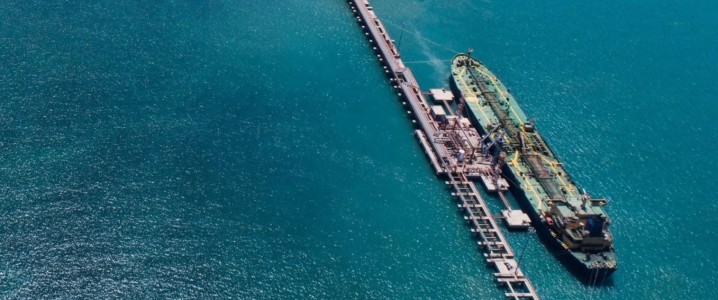Business
India’s Oil Purchases Challenge Western Sanctions Strategy

Washington’s ongoing standoff with New Delhi over Russian crude imports is revealing the limitations of Western sanctions. While India has reduced its purchases of Urals crude by about 300,000 to 500,000 barrels per day, Prime Minister Narendra Modi remains resolute in maintaining access to affordable Russian oil. The political climate in India favors defiance against external pressures, making it clear that cheap Russian crude is too valuable to relinquish.
For the United States, this situation presents a significant dilemma. The prospect of imposing higher tariffs on Indian exports could backfire, directly impacting American consumers by driving up domestic prices, which are already a pressing political concern. Indian refiners continue to import more than 1.5 million barrels per day of Russian oil. A sudden halt to these imports would likely lead to increased global fuel prices as markets scramble to fill the void.
The situation is further complicated by ongoing conflicts in Ukraine, where attacks on Russian infrastructure have disrupted supply chains. This has forced Russia to redirect more crude exports, creating additional uncertainty in the global market. Washington is acutely aware of the potential repercussions; the memory of 2022, when emergency stock releases from the Strategic Petroleum Reserve were necessary to stabilize oil prices, looms large.
China’s role in this dynamic adds another layer of complexity. As India slightly reduces its Russian oil imports, Chinese buyers have stepped in to fill the gap. China’s ability to navigate financial sanctions with shadow channels gives it an advantage that India lacks. This vulnerability makes Indian refiners more susceptible to pressure from the West. Historical context matters, as India successfully halted Iranian oil imports when faced with secondary sanctions during the Trump administration. This precedent gives the U.S. some confidence that decisive action could compel India to comply.
Critics argue that India is benefiting from discounted Russian oil, a claim that holds some truth but is not unique to India. Other nations, including China, Turkey, and Brazil, have also taken advantage of lower prices. Despite these imports, India’s domestic demand has limited the expansion of exports from its refiners. The global oil trade landscape is shifting; Asian buyers now play a larger role in dictating terms, a significant change since the onset of the Ukraine conflict.
Washington faces the risk of overreaching. If tariffs are increased and Indian purchases are sharply curtailed, global oil prices could soar past the $100 per barrel mark, a scenario few Western leaders are prepared to confront. Meanwhile, Modi’s recent meeting with Chinese President Xi Jinping in late August signifies a strengthening relationship among BRICS nations, suggesting a coordinated approach to energy resources.
Stepping back from aggressive sanctions could send a powerful message: there are limits to the effectiveness of sanctions on Russian energy, which Moscow could exploit. Balancing domestic politics, foreign policy, and energy security is becoming increasingly challenging for both the U.S. and India. For New Delhi, access to affordable crude is essential for sustaining rapid economic growth and mitigating inflationary pressures. Yet, reliance on Russia invites allegations of undermining the broader Western sanctions regime.
Currently, India’s modest reduction in Russian oil imports appears to be a compromise. It signals some flexibility without jeopardizing economic growth. However, such half-measures may not satisfy either the U.S. or India. Energy has transcended mere commodity status; it has become a currency of global power, traded in barrels and measured in diplomatic concessions. India’s position underscores the fragile nature of Western sanctions, the opportunism of China, and the reality that Russian oil continues to find buyers.
The next moves by Washington will have implications that extend well beyond New Delhi. Whether the U.S. opts to escalate actions or scale back, the oil market will be shaped not just by supply and demand, but by the intricacies of defiance, nationalism, and geopolitical rivalry.
-

 Politics4 weeks ago
Politics4 weeks agoSecwepemc First Nation Seeks Aboriginal Title Over Kamloops Area
-

 World5 months ago
World5 months agoScientists Unearth Ancient Antarctic Ice to Unlock Climate Secrets
-

 Entertainment5 months ago
Entertainment5 months agoTrump and McCormick to Announce $70 Billion Energy Investments
-

 Science5 months ago
Science5 months agoFour Astronauts Return to Earth After International Space Station Mission
-

 Lifestyle5 months ago
Lifestyle5 months agoTransLink Launches Food Truck Program to Boost Revenue in Vancouver
-

 Technology3 months ago
Technology3 months agoApple Notes Enhances Functionality with Markdown Support in macOS 26
-

 Lifestyle3 months ago
Lifestyle3 months agoManitoba’s Burger Champion Shines Again Amid Dining Innovations
-

 Top Stories2 months ago
Top Stories2 months agoUrgent Update: Fatal Crash on Highway 99 Claims Life of Pitt Meadows Man
-

 Politics4 months ago
Politics4 months agoUkrainian Tennis Star Elina Svitolina Faces Death Threats Online
-

 Sports5 months ago
Sports5 months agoSearch Underway for Missing Hunter Amid Hokkaido Bear Emergency
-

 Politics5 months ago
Politics5 months agoCarney Engages First Nations Leaders at Development Law Summit
-

 Technology5 months ago
Technology5 months agoFrosthaven Launches Early Access on July 31, 2025




















